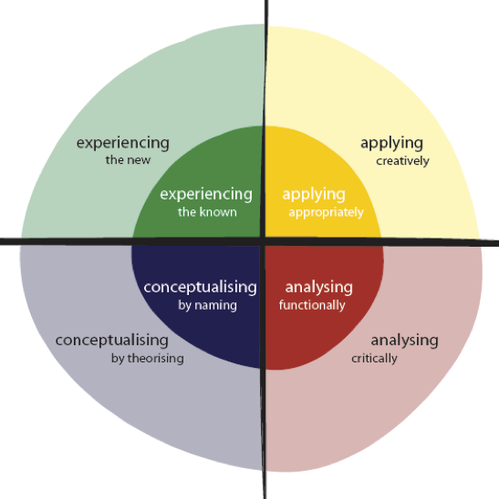現在お買い物カゴには何も入っていません。

Using the Pedagogy of Multiliteracies and SPACE to fend off AI-generated assignments
I’ve been teaching my “History of Video Games” class for the past 6 weeks now, and each week students are given a homework assignment which asks them to play and think about a game or platform from a particular era.
I’ve framed the “play and think about” part from a variety of perspectives:
- Zagal’s concept of game literacy. Understanding games in terms
- Culture,
- Technology,
- Connection to other games,
- The game’s structure and the experience
- Interviewing a relative about their experience
- The social, political, economical impact of the game
But I’m noticing some problems.
“So what?”
With the talk of participation in #⚙gameterakoya_motherbase🌿 on the LLP Discord, I can’t help but ask myself the same question here. What is the point of students gaining/improving their game literacy and knowledge? To what end? What do they gain from it? 🤔
AI-usage
In general, my grading scheme is simple. Students get 10 points if they complete the homework assignment, 0 if not. But, I give students extra credit based on the depth of their work, and I’ve let them know that. At the start of each class, I note who got extra credit, stating why.
Whether students are aiming to get these extra credits the prime factor or not, I’m noticing more and more AI usage in the homework assignments.
I’m not able to run AI plagiarism checkers on their work because its too short (according to Turnitin’s policy, anyway). But it’s just so obvious. There really is no soul to the writing. It’s enthusiastic (I see lots of use of “incredible” “revolutionary” “amazing” scattered throughout the papers) but when reading it, it’s just flat. Really soul-sucking as a teacher to read, to be honest.
I’ve even seen students clearly try to get around any plagiarism checking by deliberately misspelling words. You’d be surprised. They might have an immaculately structured sentence with some difficult words, but “this” is spelt “thos” whilst more difficult words are perfectly fine….! 🤣
Some students are NOT using AI though, and really, its so so obvious when you get a paper that is written from the heart. 💯 for you, engaged student!
Possible solution
To tackle both problems, I’m shifting the teaching of this class to be less lecture-based and align it more with the steps in a PedML approach. I’ll also practice what I preach in terms of my “SPACE-based” teaching manifesto.
For the SPACE aspect, I took notes and came up with the following:
| Safety | The grading system is already a good, safe place for students to do their best work. They not graded on a scale, but may get extra credit for providing deeper insights (I should make it concrete what I mean by this, though) |
| Participation | Interview each other? Work in groups? Conduct more interviews with non-classmates? |
| Agency | Choose to answer one of several questions that I pose. Choose a topic. Make their own groups. |
| Critical | Zagal’s game literacy aspects. Position games in social, political, economical circles. Consider positives and negatives of games. |
| Experiences | Reflect on the content and connect it to their individual experiences. |
For the PedML aspect, I considered this structure for the upcoming class:
🔴 PART 1: Experiencing (Warm-up)
- think-pair-share activity on one of three topics
🟠 PART 2: Understanding (Group Jigsaw)
- study one of four different topics in a group (my slides are available for reference)
- share info with other groups (who will be studying one of the other topics)
🟢 PART 3: Analysing (Discussion)
- discussions based on one of four different topics (related to part 2)
🔵 PART 4: Applying (Meme making)
- make a meme based on the content covered in the class
🟣 PART 5: Reflection (Connect the content to YOU)
- three questions:
- What did you learn,
- What was surprising/interesting,
- How does it relate to your own experiences?
The full worksheet (in all its emoji-splattered glory) is available below.
Why do I think this is anti-AI?
The most obvious change is that rather than lecturing in class and then offloading all of student engagement and activity to the homework assignment (granted, there are some discussions in class now, but they are not recorded on a worksheet), students become active participants in class. My role as sage on the stage is removed, and my mediation will involve asking questions during the various activities as well as answering student questions if they do not understand what is on my slides, or require further information about a topic. This, I think is one of the real benefits of PedML, positioning student experiences first and foremost with reflection and analysis activities based on those experiences.
The other big change is to have the students talk and interact more (SPACE). Discussions and group work are live, real-time exchanges of ideas which cannot really be AI-mediated. I don’t want to read the opinion of an AI, I want to hear the opinions of my students as they grapple with questions related to class topics.
I don’t want to read the opinion of an AI, I want to hear the opinions of my students as they grapple with questions related to class topics.
I have also included several sections in the lesson plan which ask students about their specific, lived experiences, which, based on the homework assignments that I have been getting, is the best way to get students to engage, and forego the use of AI. This should also alleviate my fear that the class has no real purpose or value to students. They have chosen to take this elective class, so they must have some interest in it (though, we know that some students only take certain classes to fulfill their credit requirements…). By asking students to connect course topics to their current lives and potential futures, we can help them see how what they’re learning relates to the kind of society they want to participate in. I think that even this small amount of personal reflection should make the value of the course more apparent to both the students and me. It should also help me answer the ever-present question: “So what?”
Of course, this is still not 100% AI-proof. For example, students could use AI as part of the “understanding” activity to generate answers to the topics I’ve asked them to engage with. But even in this case, AI-generated information will need to be transmitted from student to student in an oral exchange. Students could also just generate their own personal reflections in AI, but if they do, we really are heading into a dystopia…. Though, it has been seen:
surely no one would dare use ChatGPT to write something personal. But one of his students turned in a reflection with robotic language and awkward phrasing that Green knew was AI-generated. A philosophy professor across the country at the University of Arkansas at Little Rock caught students in her Ethics and Technology class using AI to respond to the prompt “Briefly introduce yourself and say what you’re hoping to get out of this class.”
https://nymag.com/intelligencer/article/openai-chatgpt-ai-cheating-education-college-students-school.html
I’m looking forward to teaching this class, and based on how it goes, will change my other classes in this lecture series to follow suit.
As always, if you did read this far, thanks!
If you have any comments or questions, please let me know here or on the LLP Discord. Specifically, my channel.

コメントを残す